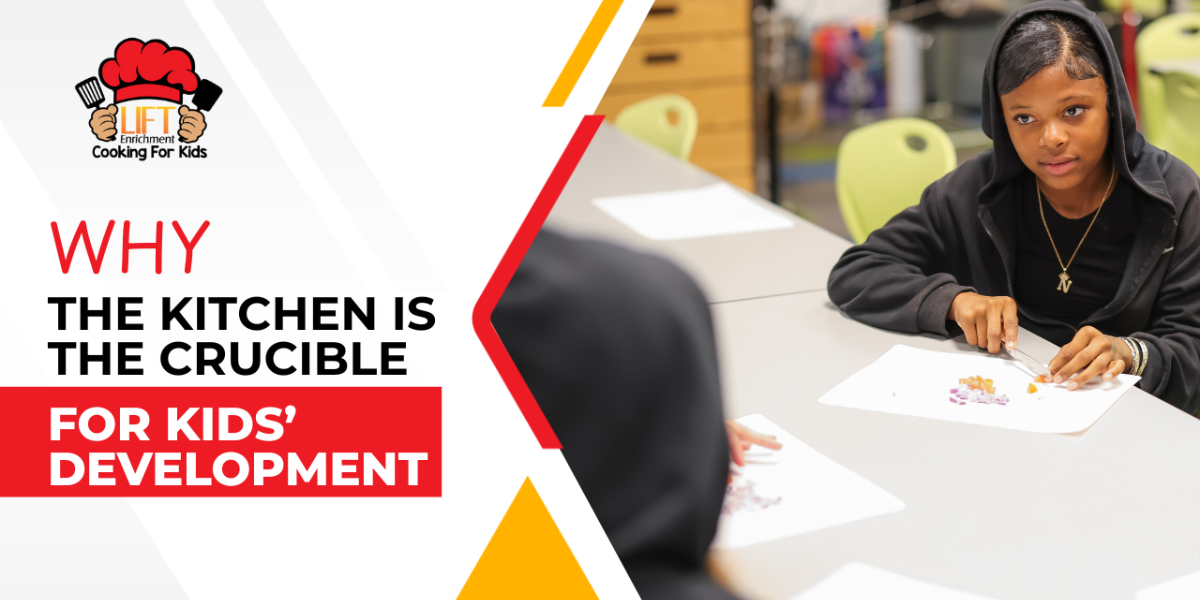Imagine you’re job hunting, and you stumble across a job description looking for someone (with a very particular set of skills) who can…
- pay attention to detail
- plan ahead
- follow instructions carefully
- make decisions and problem-solve when challenges arise
- respond quickly to feedback
- manage their time well
- manage multiple tasks to deadlines
- work in sometimes stressful environments
- handle sensitive equipment and sharp objects
- stay organized
- and work well with as part of a team
Sounds like a fairly responsible job, right?
Someone with those skills, after all, is going to be pretty valuable in the workplace.
Well, actually…
This isn’t a job description.
It’s a list of skills K1-K12 children learn in cooking classes!
As child psychologist Dr. Kairen Cullen explains,
“Cooking is brilliant.
It ticks so many boxes. It’s really relevant, it’s collaborative, it’s social, it uses lots of interesting materials, there’s an outcome at the end, there’s a sense of achievement, there can be things like early counting and measuring and estimation skills… lots and lots of language, time factors… it’s got so many things to offer.”
At LIFT enrichment, we 100% agree.
Children learn a massive amount of skills in the kitchen.
In school, kids learn fractions, decimals, counting, division, and multiplication.
In the kitchen, kids get a chance to use them and master them. Measuring a ¼ cup of flour, 2 oz of butter, a quart of vegetable stock, 2 teaspoons of sugar, chopping half a carrot, sauteing onions for 10 minutes…
Following a recipe is basically applied math.
It’s Applied Chemistry, too.
Watching how flour and water becomes dough, how eggs and sugar whip into peaks, how pastry rises, how vegetables soften, how eggs harden, how meat caramelizes, how butter melts, how spinach wilts, how batter fries, how water bubbles, and how oil separates and taste buds tingle…
The kitchen teaches kids the fundamentals of chemistry.
And, with these things they can actually eat at the end.
Could the kitchen be creating sportier kids?
It’s well known that kids who throw and catch things with their parents develop better hand-eye coordination and become better at sports later on.
Now, this might be a bit of a stretch, but perhaps the same is true of cooking too.
There’s hardly anything a child can do in the kitchen that doesn’t involve fine motor skills. Whisking, stirring, chopping, grating, mixing, sieving, weighing, cracking, scrambling, rolling, brushing… Plus, as anyone who’s whisked cream or made bread dough will know, cooking can require a lot of muscular strength too.
Cooking makes little adults.
We read a story the other day of someone who’d been taught to cook at a very early age, who was looking back fondly at the menus she designed for her family (from which you could order things like “Sandwiches Of All Kinds,” “Bagels,” and “Potatoes”.)
Cooking, she reflected, gave her a taste of real-world work. (In this case, running a small restaurant).
Given the job description we wrote above, it’s not hard to see why. How many things do children do that require so many skills at the same time?
Not many.
Creates competent & confident kids
As parents and teachers, we want our children to be safe.
And that’s why learning kitchen skills with a chef is great. They can learn how to handle sharp knives and hot stoves without hurting themselves, giving them the confidence and competence that comes from mastering difficult things.
Expands their horizon
Show a child how to cook healthy, homemade food, even just once and they’ll have a tasty alternative to junk food for the rest of their lives.
As Emerson put it, the mind once exposed to a new idea never goes back to its original shape.
The things we shape, mold, and create also shape, mold, and create us. The things we work on, and the things we teach, also teach and work on us.
Put simply, we become what we do.
Children become what they do, too.
And that’s why we believe so strongly in after-school cooking programs. Yes, they teach kids how to cook healthy and nutritious meals. But also, as so many chefs have discovered, the kitchen helps kids become the best versions of themselves while they’re at it.
If you believe likewise, and you’d like to learn more about signing your school up for after-school cooking programs you can schedule a call with one of our team by clicking the link below:
Previous Newsletters:
The #1 food for a student’s brain? Chef Daniel, New York Schools Are Saying About Our Program, Why Good Food Equals Good Grades, To change kids’ lives, start by changing their diets
